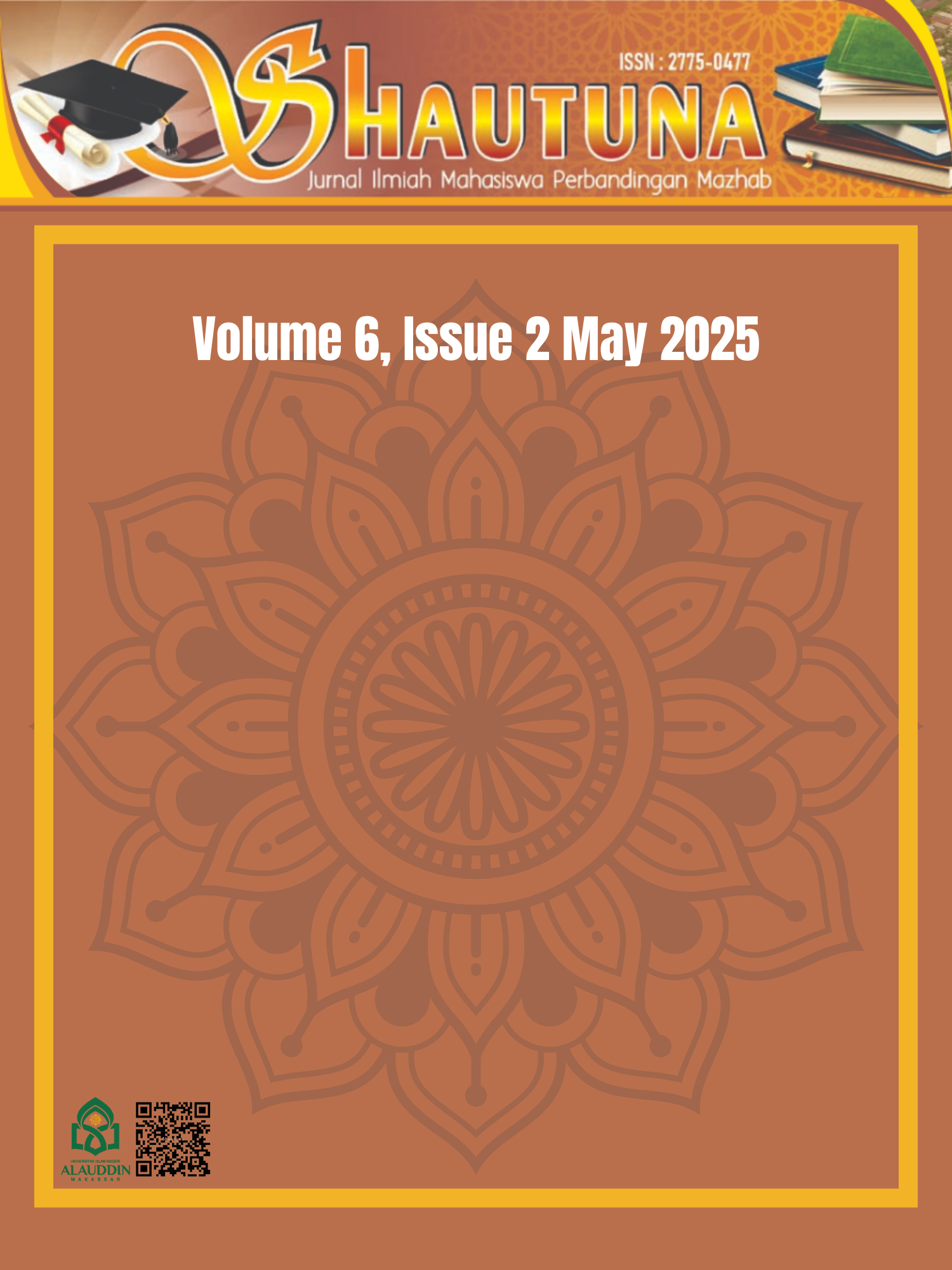Epistemology of Al-Shifāʾ Law in Islamic Jurisprudence
Integrating Revelation-Based Healing Into Contemporary Discourse
DOI:
https://doi.org/10.24252/shautuna.v6i2.57870Keywords:
Thematic Exegesis, Spiritual Healing, Ruqyah, Islamic LawAbstract
The al-Qur'an, as the word of God (kalāmullāh), has various multidimensional functions for Muslims, one of which is as a healer (al-Shifa'), for both spiritual and physical ailments. In a spiritual context, the al-Qur'an cures ailments of the heart such as misguidance, doubt, and ignorance; while in the physical aspect, the al-Qur'an serves as a means of healing through the practice of ruqyah syar'iyyah. This article aimed to examine the meaning of al-Shifa' using the thematic exegesis method (tafsīr mawḍūʿī), compile related verses, and examine the views of classical exegetes such as Ibn Kathīr and al-Rāzī, as well as contemporary exegetes such as Quraish Shihab and Wahbah al-Zuḥailī. This study also highlighted the practical implementation of the concept of al-Shifa' in the lives of Muslims, particularly in the spiritual realm and al-Quran-based alternative medicine. This study employed a qualitative approach with a literature review, examining primary literature in the form of al-Quran verses and Qur’anic exegesis books, as well as secondary literature in the form of articles, journals, and books related to Qur'anic healing. The results showed that the al-Quran, as a source of healing, had a holistic function: healing psychological and emotional aspects, and was used in physical treatment through ruqyah. Scholars agreed that the meaning of syifā' was not merely physical, but rather profoundly spiritual and theological. In practice, reciting certain verses from the al-Quran was believed to calm the soul, alleviate anxiety, and be part of faith therapy. The concept of al-Syifā' in the al-Quran provided an understanding that true healing came not only from medical treatment but also through spiritual closeness to God. The al-Quran presented a comprehensive solution to address the physical and spiritual crises facing modern humans.
References
Anggraina, Yulia Angga. “Integrasi Wahyu Dan Akal Dalam Epistemology Islam: Studi Literatur Berbasis Al Qur’an Dan Pemikiran Filsus Muslim.” Inklusi: Jurnal Pendidikan Islam Dan Filsafat 1, no. 02 (2025): 99–108. https://glonus.org/index.php/inklusi/article/view/209.
Asyraf, Muhammad. “Konsep Pengobatan Dalam Al-Qur’an (Analisis Tafsir Ayat-Ayat Ruqyah).” Universitas PTIQ Jakarta, 2023.
Aulia Razmi, Arya. “Tafsir Sufistik Dalam Sirah Nabawiyah: Analisis Teks Al-Syifa’ Karya Al-Qadi Iyad.” Academic Journal of Islamic Principles and Philosophy 6, no. 1 (2025): 33–62. https://doi.org/10.22515/ajipp.v6i1.11167.
Azidan, Farhan Lutfhi, and Zikri Raudhatul Ahsan. “Keyakinan Terhadap Kitab Al Qur-An Terkait Penyembuhan.” Student Scientific Creativity Journal 2, no. 5 (2024): 227–37. https://doi.org/10.55606/sscj-amik.v2i5.4079.
Dethan, Yuliana, Septiawadi, and Masruchin. “Ruqyah Dalam Perspektif Tafsir Isyari: Telaah Penafsiran Imam Al-Alusi Dalam Kitab Ruh Al-Ma’ani.” Al-Shamela : Journal of Quranic and Hadith Studies 1, no. 1 (2023): 1–19. https://doi.org/10.61994/alshamela.v1i1.22.
Fadli, Subhan. “Penanggulangan Terhadap Patologi Digital Melalui Pendidikan Ruhani Berbasis Alqur’an.” Institut PTIQ Jakarta, 2022. https://repository.ptiq.ac.id/id/eprint/653/.
Fina, Idamatu Silmi. “Terapi Al-Qur’an Dalam Membantu Penyembuhan Orang Dengan Gangguan Jiwa (ODGJ) Di Yayasan Aulia Rahma Kemiling Bandar Lampung.” UIN Raden Intan Lampung, 2025.
Humaira, Siti. “Penggunaan Ayat-Ayat Al-Qur’an Untuk Terapi Mental Di Islamic Therapy Center (ITC) Lamnyong Syiah Kuala Banda Aceh.” UIN Ar-Raniry, 2023. https://repository.ar-raniry.ac.id/id/eprint/29955/.
Jimmy, Jimmy, Ni Ketut Putri Ariani, I Putu Belly Sutrisna, Cokorda Bagus Jaya Lesmana, Lely Setyawati Kurniawan, and I Gusti Ayu Indah Ardani. “Aspek Spiritual Dan Penggunaan ‘Spiritual Health Assessment Scale’ Dalam Rawatan Hospice: Article Review.” HEALTHY : Jurnal Inovasi Riset Ilmu Kesehatan 4, no. 1 (2025): 20–33. https://doi.org/10.51878/healthy.v3i4.4357.
Rosli, Muhammad Alifuddin bin. “Pandangan Muhammad Quraish Shihab Tentang Lafaz Syifa’Dalam Al-Quran.” UIN Ar-Raniry Fakultas Ushuluddin dan Filsafat, 2023. https://repository.ar-raniry.ac.id/id/eprint/34262/.
Rosyanti, Lilin, Indriono Hadi, and Akhmad Akhmad. “Kesehatan Spritual Terapi Al-Qur’an Sebagai Pengobatan Fisik Dan Psikologis Di Masa Pandemi COVID-19.” Health Information: Jurnal Penelitian 14, no. 1 (2022): 89–114. https://doi.org/10.36990/hijp.v14i1.480.
———. “Spiritual Health Al-Qur’an Therapy as Physical and Psychological Treatment during the COVID-19 Pandemic.” Health Information : Jurnal Penelitian 14, no. 1 (2022): 89–114. https://doi.org/10.36990/hijp.v14i1.480.
Sany, Ulfi Putra. “Gangguan Kecemasan Dan Depresi Menurut Perspektif Al Qur’an.” Jurnal Ilmiah Indonesia 7, no. 1 (2022): 1262–78. https://doi.org/10.36418/syntax-literate.v7i1.6055.
Solihat, Dedeh. “Penggunaan Al-Quran Dalam Praktik Pengobatan Alternatif Di Klinik Patah Tulang Cimande HM Ibrahim Ciputat Tangerang Selatan.” UIN Syarif Hidayatullah Jakarta, 2020. https://repository.uinjkt.ac.id/dspace/handle/123456789/53340.
Witri, Witri. “Penggunaan Ayat Al-Qur’an Sebagai Terapi (Studi Living Qur’an Pada Praktik Pengobatan Terapi Klinik Herbal Al-Muntadzar),” 2023.
Downloads
Published
How to Cite
Issue
Section
License
Copyright (c) 2025 Nurul Wakia, Muhammad Yusuf, Hasyim Haddade, Sabriadi HR

This work is licensed under a Creative Commons Attribution 4.0 International License.









